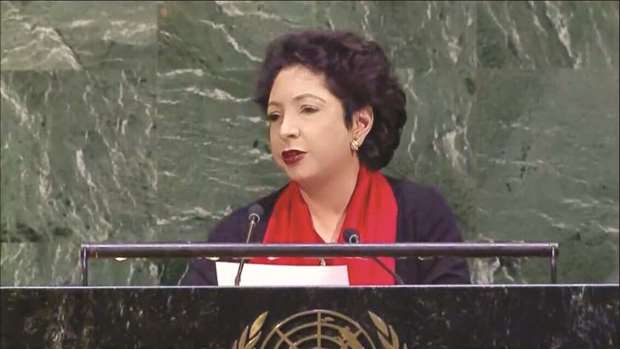Members of a group of troop and police contributing countries to United Nations peacekeeping have expressed full support for a UN plan to make the world body’s flagship operations “stronger and safer”, with Pakistan’s ambassador to the UN Maleeha Lodhi underlining the need for a shift in the peacekeepers’ mandate to find political solutions to conflicts.
At the same time, the permanent representative of Pakistan to the UN emphasised that the fundamentals of peacekeeping must be preserved while adapting to changing political and ground realities.
Lodhi made these remarks at a meeting at UN Headquarters in New York in her capacity as the co-chairperson the Group of Troop and Police Contributing Countries to UN Peacekeeping Operations.
The group was set up last year by Pakistan and Morocco to facilitate open and frank exchange of views on issues of the concerned countries and to brainstorm responses to the new challenges affecting world peace and security.
Friday’s meeting was also attended by nine ambassadors – Bangladesh, Burkina Faso, Cameroon, Ghana, Niger, Senegal, Tanzania, South Africa, and Egypt – and senior representatives from Indonesia, Uruguay, Italy and Togo as well as experts from China, Brazil, Rwanda, Chad, and Nigeria.
In March this year, UN Secretary General Antonio Guterres outlined his “Action for Peacekeeping” (A4P) initiative, which centres on three areas: refocusing peacekeeping with realistic expectations; making peacekeeping missions stronger and safer; and, mobilising greater support for political solutions and for well-structured, well-equipped, well-trained forces.
In this regard, the UN chief plans to have a special event on peacekeeping during the UN General Assembly’s High-Level Debate in September.
It would include the adoption of a document or compact outlining mutual commitments for the improvement of peacekeeping.
For that purpose, the top leadership of the UN Department of Peacekeeping Operations (DPKO) reached out to the group led by Pakistan and Morocco to discuss the way forward and to elicit their views on the five elements of the intended compact: peace-building, partnerships, peoples, politics, and performance.
In her concluding remarks, Lodhi said that the upcoming document or compact should recognise some key elements, including the importance of protection of civilians by preventing the outbreak of armed conflicts, addressing the root causes of conflicts; well-defined, realistic, and achievable mandates; political will, leadership, performance and accountability at all levels; adequate resources; policy, planning and operational guidelines, and appropriate training; effective role of regional and sub-regional organisations in the peaceful settlement of disputes, including through preventive diplomacy; and, confidence-building and mediation efforts, peacekeeping and peace-building.
“Troop and police contributing countries are ready to support all efforts to make UN peacekeeping effective and efficient, and responding to the needs of the times,” the Pakistani envoy said. “We have one overarching aim, well equipped and fit for purpose peacekeeping missions, with realistic goals.”
She added: “We see this as a collective effort, and are fully invested in its success.”
DPKO Under-Secretary-General Jean Pierre Lacroix said that the UN could not bring about any changes in peacekeeping alone, and needed strong collective action by the whole range of stakeholders.
He said that the “A4P” is a comprehensive approach which required a shared a shared response on key challenges.
The high-level event in September would seek to gather political support from member states in the form of a voluntary non-binding statement of shared commitments, Lacroix said.
Under-Secretary-General of the Department of Field Support Atul Khare said that better performance of peacekeeping is not just the responsibility of the troop contributing countries.
It requires a mindset change for all stakeholders, including the Security Council, which approves the mandates.
“Focused mandates are the need of the hour,” he said, adding that it is the responsibility of UN peacekeeping to leave a country in a better position to handle crises even after the UN mission had left.

Lodhi: We see this as a collective effort, and are fully invested in its success.
